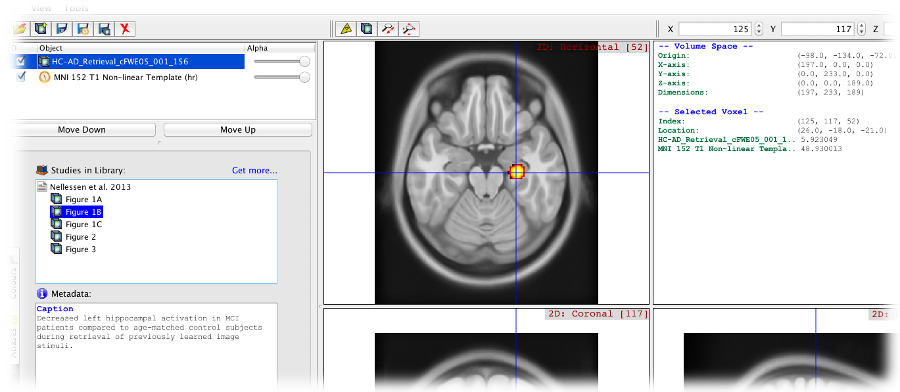Simon Eickhoff; Katrin Amunts; Sarah Genon; Danilo Bzdok; Svenja Caspers; Edna Cieslik; Peter Fox; Felix Hoffstaedter; Angela Laird; Robert Langner; Veronika Müller; Wolfgang Rieger; and Tobias Wensing
-
ANIMA was written and designed by Andrew Reid, for the Institute for Neuroscience and Medicine (INM-1), in the group of Simon Eickhoff. In 2017 the group turned into the Institute for Neuroscience and Medicine - Brain and Behaviour (INM-7). Since November 2017 Jona Marcus Fischer is administering ANIMA.
People who helped in the development of ANIMA include:
Data for each study were contributed by the authors of that study. See the data usage agreement (DUA) for specifics.
The Javascript-based Papaya image viewer is an open source project developed by Jack Lancaster and Michael Martinez, at the University of Texas Health Science Center.
For all inquiries, including data or website issues, questions about our DUA, or suggestions for improvement, please contact Jona Fischer.
-
By accessing, using, or contributing to ANIMA, you agree to abide by the terms of the following Data Usage Agreement (DUA):
-
If you use ANIMA data for your study, please include these citations:
ANIMA article:
Reid AT, Bzdok D, Genon S, Langner R, Müller VI, Eickhoff CR, Hoffstaedter F, Cieslik EC, Fox PT, Laird AR, Amunts K, Caspers S, Eickhoff SB (2015). ANIMA: A data-sharing initiative for neuroimaging meta-analyses. Neuroimage. 124(B): 1245-1253. doi: 10.1016/j.neuroimage.2015.07.060
Original article:
All individual studies from which data were derived should also be cited. Please refer to individual study pages for the appropriate references, along with DOIs for the original articles.
-

Volume Viewer is a stand-alone Java-based application that can be used to visualize, organize, modify, and save neuroimaging data. Volume Viewer has built-in support for importing ANIMA studies, and organizing them into a Library. You can also arrange and specify colour-mapping for a set of images, save this as a Volume Viewer Session, and share it as part of your ANIMA study. The most current version of Volume Viewer can be downloaded for your operating system by clicking the appropriate link below. More information on Volume Viewer (user guide, tutorials, etc.), can be found here.

Download Volume Viewer 1.1-beta for:



Mac OSX [269M] MS Windows [151M] Generic Linux [151M] Installation Instructions
NOTE:
For all operating systems, ensure you have Java 8 JDK (or better) installed! You can check by typing java -version in a terminal window. If you don't, you can install it here. For Ubuntu or Mint, follow the instructions on this page.
1.Double-click the zip archive1.Extract the zip archive somewhere you have permissions (i.e., NOT Program Files)1.Extract the tar archive wherever you put your applications2.Double-click the installer, follow the instructions2.In the extracted folder, double-click volume-viewer-win.bat2.In the extracted folder, run the program using ./volume-viewer-linux3.If you want, drag the Volume Viewer application icon into your Dock3.If you want, make the volume-viewer-win.bat file a Windows shortcut3.If you want, make a symlink somewhere on your path (e.g., /usr/local/bin)4.Enjoy!4.Enjoy!4.Enjoy! -
Who's using ANIMA?
-
ANIMA provides an API for more tech-savvy users. This is accessible by appending one of the following commands to the ANIMA domain:
Returns a json file with an array of URLs pointing to all redistributable study XML files. The XML file contains all metadata for the study and its elements.
Returns a json file with an array of URLs pointing to all redistributable archives in the database (one for each study). Each archive contains the most recent version of its study.
-
ANIMA gives you the possibility to share your studies with other people all around the world. If you just download study data and related documents no account is needed. For those who want to distribute and manage their studies there is the possibility to create an account. Therefore some personal data of you will be collected and stored in a database. Please take a moment to familiarize yourself with our privacy policy:
What personal data are we collecting?
Personal data means any information that can be used to identify directly or indirectly a specific individual.
The data we use to identify you is given by you. This personal data are your name and surname, the institute and department you work for (this information is optional), your email and the country you live in.What purpose do we use your data for?
Your data is used to identify you and assign you to the studies you distributed so that you can edit those and add new ones. In addition we use your country to evaluate where ANIMA is used around the globe. The result of this evaluation you can see in our „PLOTS“-Tab. Your email address is being used to verify your account and to notify you about things going on regarding ANIMA and your studies.
Who is collecting the data?
Your data is collected by the Institute for Neuroscience and Medicine (INM-7) directed by Simon Eickhoff. Responsible for maintaining ANIMA is Jona Marcus Fischer.
Who will it be shared with?
We have no intention to share your personal data with anyone. And we won’t. Your personal data will not be given to third parties and will not be distributed. The studies you distribute we will just make available through ANIMA and only with your permission. People that download your study have to agree with our Data Usage and Contributor Agreement which you can review in the "DUA"-Tab.
How do we protect your personal data?
We take the security of your personal data very seriously. We take every effort to protect your personal data from misuse, interference, loss, unauthorised access, modification or disclosure.
Our measures include implementing appropriate access controls, using latest Information Security Capabilities of our research institution to protect the IT environments we leverage, and ensuring we encrypt, pseudonymise and anonymise personal data wherever possible.
Access to your personal data is only permitted among the administrators of ANIMA on a need-to-know basis.